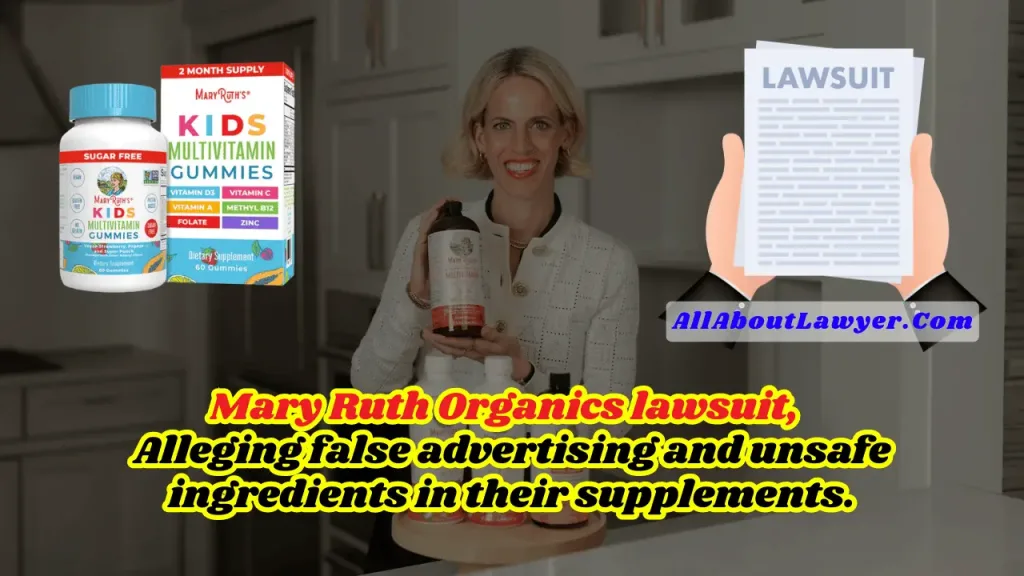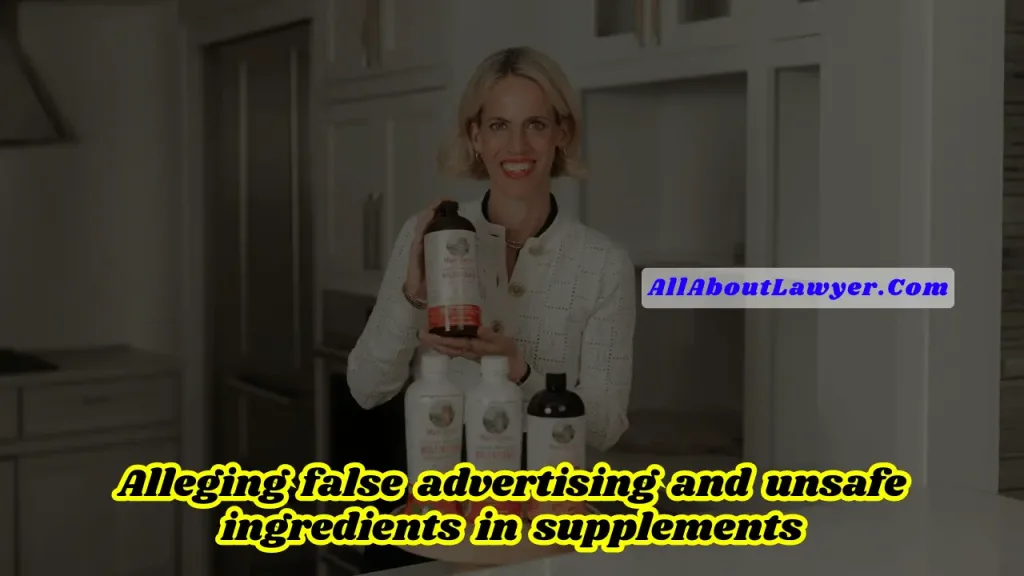Mary Ruth Organics Lawsuit | Examining False Advertising, Ingredient Discrepancies, and Industry Impact
The organic and natural supplement market has grown substantially, with brands like Mary Ruth Organics becoming household names for health-conscious consumers. Founded by MaryRuth Ghiyam, a certified health educator, the brand is known for its line of liquid multivitamins, probiotics, and other health supplements. However, Mary Ruth Organics is now facing a legal battle that could have serious implications for the brand’s reputation. The Mary Ruth Organics lawsuit has raised concerns about false advertising, ingredient misrepresentation, and quality control issues.
In this article, we will explore the key allegations made in the lawsuit, the impact on consumers, and the broader implications for the supplement industry. To further bolster the credibility of this discussion, it is recommended that citations to relevant studies, legal documents, or regulatory guidelines be incorporated. Additionally, the inclusion of expert opinions could provide valuable insights and enhance the authority of the claims presented.
Table of Contents
Key Allegations in the Legal Complaint
The Mary Ruth Organics lawsuit outlines several significant accusations that question the transparency and ethical practices of the brand:
- False Advertising
The plaintiffs accuse Mary Ruth Organics of misleading marketing by overstating the benefits and purity of its products. Despite being marketed as organic and natural, the lawsuit claims that the company’s supplements may not fully meet these standards. - Ingredient Discrepancies
One of the most damaging allegations is that some of the supplements contain synthetic ingredients, despite being marketed as completely natural. Consumers who purchased these products under the belief that they were organic feel deceived. - Quality Control Issues
There are claims that certain products may have been contaminated during the manufacturing process, raising questions about the company’s quality control standards. Such contamination could potentially pose health risks to consumers. - Regulatory Non-Compliance
The lawsuit suggests that Mary Ruth Organics may have violated FDA and FTC regulations concerning supplement labeling and marketing practices. Failure to comply with these regulations can lead to severe legal consequences and loss of consumer trust.

The Ripple Effect: Impact on Consumers and the Industry
The Mary Ruth Organics lawsuit has sent tremors through the supplement industry and raised significant concerns among consumers:
- Consumer Trust in Crisis
- Shaken Confidence: Loyal customers who once trusted the brand now feel betrayed, questioning the integrity of the products they used to rely on for their health needs.
- Wider Skepticism: The lawsuit has sparked a broader debate about the authenticity of claims made by supplement companies. Consumers are increasingly skeptical about the transparency of organic and natural health product brands.
- Industry-Wide Implications
- Scrutiny Intensifies: Regulatory bodies such as the FDA and FTC may ramp up their oversight of the supplement industry following the allegations against Mary Ruth Organics.
- Market Volatility: The legal proceedings have caused uncertainty in the organic supplement market, potentially affecting both stock prices and consumer behavior.
Diving Deep: The Products Under the Microscope
Several of Mary Ruth Organics’ popular products are under scrutiny due to the lawsuit:
- Liquid Multivitamins: These flagship products are alleged to contain undisclosed synthetic compounds, despite being advertised as 100% organic and natural.
- Probiotic Gummies: Allegations of misleading claims about the viability of probiotic strains in these products are central to the lawsuit.
- Herbal Extracts: The purity and potency of Mary Ruth’s herbal supplements are also in question, with accusations that some batches may have contained contaminants.
The Natural vs. Synthetic Debate
The Mary Ruth Organics lawsuit has reignited the debate about what truly constitutes a natural product. Experts are weighing in on the potential benefits and risks of synthetic ingredients in health supplements:
- Defining “Natural”: The lawsuit underscores the need for clearer definitions of what constitutes a “natural” supplement in an industry where marketing terms can be ambiguous.
- Synthetic Ingredients: While some synthetic compounds may enhance the efficacy of supplements, they contradict the expectations of consumers seeking purely organic and natural products.
Legal Landscape: Navigating the Mary Ruth Organics Lawsuit
As the lawsuit unfolds, it is essential to understand the legal complexities surrounding the case, especially with the introduction of other legal disputes involving Mary Ruth Organics.
- Trademark Lawsuit with Doctor Danielle LLC
In addition to the primary lawsuit, Mary Ruth Organics LLC was involved in another legal battle with Doctor Danielle LLC. The case, 22-006 – Doctor Danielle LLC v. Mary Ruth Organics LLC, filed in the United States District Court Eastern District of Washington, centers on trademark infringement under the Lanham Act (15:1125). The lawsuit claims that Mary Ruth Organics used a “confusingly similar trade dress” to that of Doctor Danielle, creating brand confusion in the market.
Doctor Danielle LLC alleged that Mary Ruth Organics’ packaging was deliberately designed to mimic its own, while Mary Ruth Organics countered by stating that any similarities were coincidental. The case was dismissed in August 2022, but it raised questions about the brand’s ethical business practices. - Potential Outcomes of the Current Lawsuit
- Financial Settlements: If the Mary Ruth Organics lawsuit is successful, the company may be required to pay significant financial compensation to affected consumers.
- Regulatory Repercussions: Mary Ruth Organics could face fines and tighter regulatory scrutiny if the lawsuit reveals non-compliance with FDA or FTC regulations.
- Brand Rehabilitation: In the wake of the lawsuit, Mary Ruth Organics will have to work hard to rebuild consumer trust, potentially through new transparency initiatives and better quality control processes.
Also Read: Erle Stanley Gardner and Other Legendary Trial Lawyers Who Shaped Legal History
Consumer Advocacy in the Supplement Space
The Mary Ruth Organics lawsuit has empowered consumer advocacy groups to push for greater transparency in the supplement industry. This case is highlighting the need for:
- Label Literacy: Consumers are being educated on how to read supplement labels more critically, looking beyond marketing claims to evaluate product content.
- Third-Party Testing: There is an increasing demand for supplements to undergo independent testing and certification to ensure that they meet quality and safety standards.
The Future of Organic Supplements Post-Lawsuit
As the Mary Ruth Organics lawsuit continues to make headlines, the broader supplement industry is likely to see several changes:
- Industry Adaptations
- Transparency Initiatives: Supplement companies are expected to invest in clearer, verifiable product information to regain consumer trust.
- Innovation in Verification: The lawsuit could lead to new technologies that allow consumers to trace the purity and source of ingredients in their supplements.
- Regulatory Evolution
- Tightened Guidelines: Expect more stringent FDA and FTC regulations governing the marketing and labeling of “natural” and “organic” supplements.
- Enhanced Enforcement: Regulatory bodies may step up their efforts to monitor and penalize non-compliant supplement manufacturers.

Conclusion: Lessons from the Mary Ruth Organics Lawsuit
The Mary Ruth Organics lawsuit is a pivotal moment for the supplement industry, underlining the need for:
- Uncompromising Transparency: Brands must communicate honestly about their ingredients and production processes.
- Rigorous Quality Control: Enhanced testing and verification processes are essential to ensure the purity and safety of products.
- Ethical Marketing: Companies need to move towards evidence-based claims and responsible advertising practices.
- Consumer Education: There is a growing demand for resources that empower consumers to make informed decisions about their health and supplement choices.
As legal proceedings unfold, the Mary Ruth Organics lawsuit could reshape the landscape of the supplement industry, setting a new precedent for accountability and transparency.
Read also: Sierra Mist Lawsuit | Untold Legal Story Behind PepsiCo’s Rebranding
FAQs
What is the Mary Ruth Organics lawsuit about?
The lawsuit accuses Mary Ruth Organics of false advertising, misleading health claims, and potential ingredient misrepresentation, along with quality control issues.
What happened in the trademark lawsuit between Mary Ruth Organics and Doctor Danielle LLC?
In 2022, Mary Ruth Organics was sued by Doctor Danielle LLC over a trademark infringement issue, alleging that Mary Ruth’s packaging closely resembled Doctor Danielle’s. The case was dismissed in August 2022.
What are the health risks associated with Mary Ruth Organics products?
The lawsuit raises concerns about potential contamination and synthetic ingredients in products that were marketed as organic, which could pose health risks.
Will consumers receive compensation if the lawsuit is successful?
If successful, the lawsuit could result in financial compensation for affected consumers, including refunds or settlement agreements.
About the Author

Sarah Klein, JD, is a former consumer rights attorney who spent years helping clients with issues like unfair billing, product disputes, and debt collection practices. At All About Lawyer, she simplifies consumer protection laws so readers can defend their rights and resolve problems with confidence.
Read more about Sarah
About the Author

Sarah Klein, JD, is a licensed attorney and legal content strategist with over 12 years of experience across civil, criminal, family, and regulatory law. At All About Lawyer, she covers a wide range of legal topics — from high-profile lawsuits and courtroom stories to state traffic laws and everyday legal questions — all with a focus on accuracy, clarity, and public understanding.
Her writing blends real legal insight with plain-English explanations, helping readers stay informed and legally aware.
Read more about Sarah
